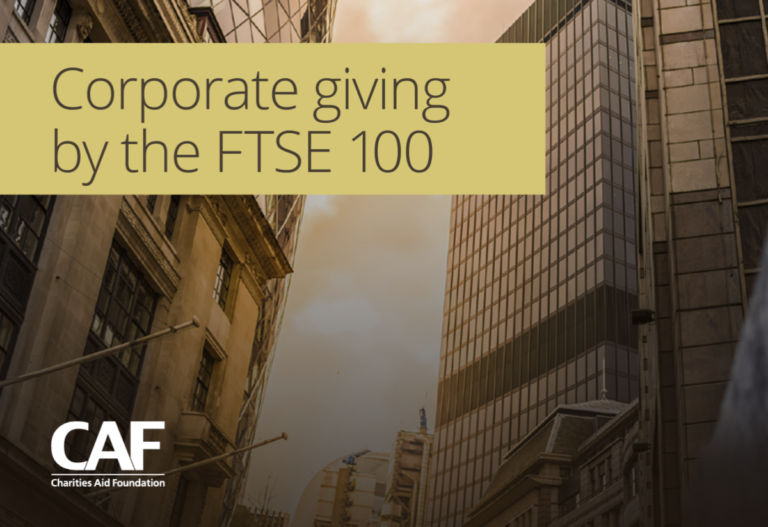Charitable giving by FTSE 100 companies drops a quarter in a decade, research suggests

FTSE 100 companies gave £1.85 billion to charities last year, which is 26% less than the £2.51 billion they gave a decade ago, according to new research by the Charities Aid Foundation (CAF).
And, taking into consideration the increases in inflation during this period, this drop represents an even greater cut to charitable funding in real terms, the report highlights.
2022 saw a quarter of top UK-listed companies donate at least 1% of pre-tax profits. GSK is the most generous, donating more than 5% of profits, while Shell just misses inclusion in the bottom 20, giving just 0.28% last year, which is six and half times less than in 2016 when the analysis was last carried out.
Advertisement
Corporate giving by FTSE 100 – ranked by proportion of pre-tax profits donated – top 10
| Rank | Name of company | Industry | Charity as % of pre-tax profits |
| 1 | GSK | Healthcare | 5.47 |
| 2 | Endeavour Mining | Basic Materials | 4.91 |
| 3 | AstraZeneca | Healthcare | 4.55 |
| 4 | J Sainsbury | Consumer Staples | 4.50 |
| 5 | Tesco | Consumer Staples | 4.39 |
| 6 | Hiscox | Financials | 4.03 |
| 7 | St James’s Place | Financials | 3.71 |
| 8 | Fresnillo | Basic Materials | 3.54 |
| 9 | WPP | Consumer Discretionary | 3.06 |
| 10 | Whitbread | Consumer Discretionary | 2.92 |
Bottom five for charitable giving
The bottom five FTSE 100 companies for charitable giving are: B&M European Value Retail (giving 0.07%), 3i Group (0.04%), BT Group (0.02%), Associated British Foods (0.00%) and Pershing Square Holdings (0.00%).

Combined profits have trebled since 2016
This year’s Corporate giving by the FTSE 100 report shows that the total amount donated in 2022 is the same as in 2016 with donations declining 17% in real terms since then. At the same time, the combined profits of the FTSE 100 have trebled over the same period to £229.7bn with the median pre-tax profit reaching £611mn, up 25% since 2016.
In addition:
- The number of companies donating the sum equivalent to at least 1% of their pre-tax profits has also stayed roughly constant – 24 companies gave 1% or more last year, compared to 26 in 2016.
- The average amount donated by FTSE 100 as a percentage of pretax profits has fallen from 2.4% to 0.8%.
- The healthcare sector is the most generous – despite only having 5 companies in the FTSE 100, it accounts for 22% of the total.
According to CAF, if the companies in the FTSE 100 had continued to donate the same proportion of pre-tax profits that they did in 2016, the charity sector would have received an additional £3.74 billion of funding.
Neil Heslop OBE, Chief Executive of the Charities Aid Foundation commented:
“The role of FTSE 100 businesses in leading a purposeful corporate culture is vital. It is brilliant that a quarter of the UK’s top hundred listed companies are setting an example by committing to the best practice of donating 1% to good causes. But more can and should be done, especially now as household incomes are squeezed and charity finances are strained due to the cost-of-living crisis.
“A resilient civil society requires charities, the private sector and government to all play a role. That is why we urgently need the Government to draw up a national strategy on philanthropy and charitable giving to mobilise effort by businesses and all of us.”
According to CAF, more than two-thirds (69%) of the public believe businesses have an obligation to support the local communities in which they operate and 70% believe businesses should be more open and transparent about their charitable donations. However, businesses have not been compelled to report on their community investment and philanthropy in company annual reports since 2013.
About the report
This is the fourth edition of the CAF Corporate Giving by the FTSE 100 report – the first report since 2018, which analysed 2016 data. It is based on details of community investment and general philanthropy recorded in annual reports and in ESG (Environmental Social and Governance) reports. For the first time, companies were surveyed by CAF about their giving and asked to expand on details contained in company reports.
This report is based on the framework provided by Business For Societal Impact (B4SI) and looks at support given globally to charities and community causes by FTSE 100 companies in the form of voluntary cash and in-kind donations, matched employee funding, employee volunteering and the management costs incurred from supporting community initiatives. It does not include family foundations.



